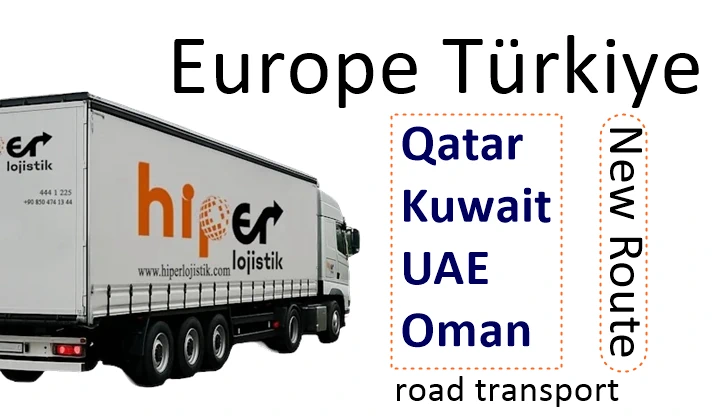
Frequently Asked Questions About CMR
The CMR Convention is a fundamental legal framework that governs international road transport. It’s particularly important for logistics companies, freight forwarders, and transport service providers. The CMR document serves as proof of the contract of carriage, detailing the rights and obligations of both shippers and carriers, and defining the terms of liability for loss, damage, or delay to goods in transit. As companies aim to ensure compliance and minimize risks in cross-border transport, CMR regulations become essential for smooth operations.
One of the most frequently searched questions related to CMR revolves around how the liability is structured, what happens in case of damage, and the overall CMR insurance coverage. Additionally, queries about how the CMR Convention applies in different countries, how to issue a CMR waybill, and whether CMR rules cover multimodal transport are highly common. For businesses involved in international logistics, having a clear understanding of the document’s function is crucial for avoiding legal disputes.
In this article, we will cover 100 questions about CMR, addressing common issues such as what is CMR, how to fill out a CMR waybill, CMR liability limits, and which countries are part of the CMR agreement. This will provide a comprehensive resource for logistics professionals and those involved in international transportation, ensuring clarity on the key aspects of CMR documentation.
100 Most Frequently Asked Questions and Answers About CMR
1. What is CMR in logistics?
CMR stands for “Convention on the Contract for the International Carriage of Goods by Road”. It is an international agreement regulating the responsibilities and liabilities of parties involved in the transportation of goods by road.
2. Who uses a CMR document?
The CMR document is used by carriers, senders, and consignees in international road transport to document the contract and terms of shipment, providing legal protection for all parties.
3. Is a CMR document legally required?
Yes, a CMR document is legally required for all international road transport between countries that are signatories to the CMR Convention.
4. What details are included in a CMR note?
A CMR note includes details such as shipper’s name, consignee’s name, description of goods, route, and liabilities in case of damage or loss during transit.
5. What happens if goods are damaged during transport under a CMR agreement?
Under CMR regulations, the carrier is liable for loss or damage of goods unless it was caused by circumstances beyond their control, such as force majeure.
6. How long is the liability period for carriers under CMR?
The liability of the carrier under the CMR Convention generally lasts from the moment they take possession of the goods until they are delivered to the consignee.
7. What is the weight limit for CMR coverage?
CMR limits liability to 8.33 Special Drawing Rights (SDR) per kilogram of gross weight for damaged or lost goods unless otherwise stated in the contract.
8. Can a CMR be used for domestic transportation?
While the CMR Convention is intended for international transport, some countries apply CMR rules to domestic transportation under their national legislation.
9. What is the CMR insurance?
CMR insurance provides coverage for carriers in case they are found liable under the terms of the CMR agreement for damages, loss, or delays in the transport of goods.
10. Can a CMR note be issued electronically?
Yes, an electronic CMR (e-CMR) can be issued as part of modern digital logistics solutions, improving efficiency and traceability in the supply chain.
11. What countries are part of the CMR Convention?
The CMR Convention is adopted by over 55 countries, including most of Europe, Central Asia, and parts of the Middle East, covering significant international road transport routes.
12. What is the purpose of a CMR document?
A CMR document serves as proof of the contract between the shipper and the carrier, outlines the terms of the shipment, and specifies liability in case of damage or loss.
13. What are the limitations of carrier liability under CMR?
Under CMR rules, the carrier’s liability is capped at 8.33 Special Drawing Rights (SDR) per kilogram unless the shipper declares a higher value for the goods.
14. Can a CMR document be altered after issuance?
Once issued, a CMR document cannot be altered unless all parties involved — shipper, carrier, and consignee — mutually agree to the changes in writing.
15. What happens if the consignee refuses to accept the goods under a CMR agreement?
If the consignee refuses the goods, the carrier must inform the shipper, who may instruct the carrier on the next steps, such as returning or storing the goods.
16. How does the CMR Convention handle delays in delivery?
The CMR Convention holds carriers liable for delays in delivery, unless they can prove the delay was due to unforeseen circumstances outside of their control.
17. What is the difference between a Bill of Lading and a CMR document?
A Bill of Lading is used for sea freight, whereas a CMR document is specific to road transport, but both serve as a contract for carriage and a receipt of goods.
18. Can multiple shipments be covered under a single CMR document?
No, a separate CMR document is typically required for each shipment, ensuring clear documentation of the cargo, responsibilities, and liabilities for each transport.
19. What is a CMR consignment note?
A CMR consignment note is a document provided by the shipper to the carrier, outlining essential details of the cargo and forming the basis for the CMR contract of carriage.
20. How are disputes resolved under the CMR Convention?
Disputes under the CMR Convention are typically resolved by arbitration or in courts of the countries where the dispute arose, based on the jurisdiction agreed upon in the contract.
21. What languages is the CMR document available in?
The CMR document can be issued in any language agreed upon by the parties, but it is common to use English, French, or the official languages of the countries involved in the transport.
22. Is a CMR document required for all types of goods?
Yes, a CMR document is required for the international transport of all types of goods by road, regardless of the nature of the cargo.
23. Does CMR apply to courier services?
Yes, CMR regulations apply to courier services if they involve international road transport and are conducted between countries that are signatories to the CMR Convention.
24. How is liability determined in case of theft during transport under CMR?
In case of theft, the carrier is liable unless they can prove that the incident was beyond their control or resulted from the negligence of the shipper or consignee.
25. What is the difference between CMR insurance and regular cargo insurance?
CMR insurance covers the carrier’s liability under the CMR Convention, while cargo insurance typically covers the value of the goods in case of loss or damage, regardless of fault.
26. Can the CMR Convention be applied to multimodal transport?
Yes, the CMR Convention can apply to multimodal transport if part of the journey is carried out by road between CMR member countries.
27. Is there a time limit for claims under CMR?
Yes, the time limit for claims under the CMR Convention is typically one year from the date of delivery or the date the goods should have been delivered.
28. What are Special Drawing Rights (SDR) in CMR liability?
Special Drawing Rights (SDR) is an international monetary unit used to determine the maximum liability for carriers under CMR regulations, ensuring consistent compensation values.
29. Can a carrier limit their liability under CMR?
Yes, under CMR rules, carriers can limit their liability based on weight and value unless there’s evidence of gross negligence or deliberate misconduct.
30. What information must be included in a CMR consignment note?
A CMR consignment note must include details such as shipper and consignee information, description of goods, weight, number of packages, and agreed route.
31. What are the carrier’s responsibilities under CMR?
Under CMR regulations, the carrier is responsible for taking delivery of goods, ensuring safe transport, and delivering them to the consignee within the agreed timeframe.
32. What happens if goods are lost during transport under CMR?
If goods are lost during transport, the carrier is liable for compensation based on the weight of the goods, as per the terms of the CMR Convention.
33. Can CMR liability be increased?
Yes, the shipper can declare a higher value for the goods in the CMR contract, allowing for an increased liability and higher compensation in case of loss or damage.
34. How is CMR relevant to international road transport?
The CMR Convention standardizes the rights, responsibilities, and liabilities of parties involved in international road transport, ensuring smoother cross-border trade.
35. Is CMR applicable for non-commercial goods?
The CMR Convention primarily applies to the transport of commercial goods, but in certain cases, it may also apply to non-commercial consignments.
36. What is the purpose of a CMR consignment note?
A CMR consignment note serves as a contract of carriage, detailing the terms and conditions agreed upon by the carrier and shipper, and ensures legal clarity.
37. How can I claim compensation under the CMR Convention?
To claim compensation under the CMR Convention, you must submit a formal claim within the prescribed time limit, usually within one year of the incident.
38. What does CMR say about liability in case of delays?
The CMR Convention holds carriers liable for delays, unless they can prove the delay was due to circumstances beyond their control.
39. Does CMR cover damages caused by poor packaging?
If goods are damaged due to poor packaging by the shipper, the CMR Convention releases the carrier from liability, provided the issue was noted at the time of pickup.
40. Can CMR apply to domestic transportation?
While CMR is intended for international road transport, some countries apply its rules to domestic transport for consistency in regulations.
41. Is a signature required on a CMR consignment note?
Yes, a signature is required on the CMR consignment note from both the shipper and the carrier to ensure that both parties agree to the terms of the contract.
42. Can a CMR consignment note be rejected?
A CMR consignment note can only be rejected if there is a discrepancy in the details, or if both parties agree to amend or cancel the contract.
43. Does CMR regulate temperature-controlled transport?
Yes, the CMR Convention covers temperature-controlled transport, ensuring that the carrier is responsible for maintaining the correct conditions throughout the journey.
44. What is e-CMR?
e-CMR is the electronic version of the CMR consignment note, designed to streamline logistics processes and reduce the need for physical paperwork in road transport.
45. Is CMR insurance mandatory for carriers?
While CMR insurance is not legally required, it is strongly recommended to protect carriers against potential financial liabilities in case of loss or damage.
46. What is the role of the consignee under the CMR agreement?
The consignee has the right to receive the goods in the agreed condition and can file a claim if the shipment is damaged or delayed under the CMR agreement.
47. Can CMR be used for air and sea transport?
No, the CMR Convention is strictly for road transport. However, in multimodal transport, CMR rules apply to the road portion of the journey.
48. How is the value of goods determined in a CMR claim?
The value of goods in a CMR claim is typically based on the invoice value or the market value at the time of shipping, depending on the terms of the contract.
49. How are CMR claims processed?
CMR claims must be submitted in writing, and the carrier has a duty to respond. Claims may lead to negotiation, mediation, or court proceedings if unresolved.
50. What is a CMR contract?
A CMR contract is a legal agreement between the shipper and the carrier that outlines the terms and conditions for the international road transport of goods.
51. What is the role of the shipper under CMR?
The shipper is responsible for providing accurate information about the goods, ensuring proper packaging, and complying with the terms set out in the CMR consignment note.
52. Can CMR liability be waived?
No, CMR liability cannot be entirely waived, but it can be limited based on weight and value unless specific terms are agreed upon in the contract.
53. How does CMR handle hazardous goods?
The CMR Convention covers hazardous goods, but the shipper must ensure the goods are properly declared and packaged according to international regulations.
54. What happens if the CMR consignment note is lost?
If the CMR consignment note is lost, the transport is still valid, but the parties may need to rely on other documentation to prove the terms of the contract.
55. What is the role of customs under CMR?
The CMR Convention requires carriers to comply with customs regulations, ensuring goods pass through customs without violating international trade laws.
56. Is CMR coverage limited to specific countries?
The CMR Convention applies to international road transport between signatory countries, which includes most of Europe, parts of Asia, and the Middle East.
57. How can the consignee file a claim under CMR?
The consignee must file a written claim for damaged or delayed goods within one year, providing evidence of the condition of goods and other relevant details.
58. What is the difference between domestic and international CMR?
The CMR Convention is designed for international transport, but some countries adopt similar rules for domestic transport to maintain consistency in logistics.
59. How does CMR impact transportation companies?
CMRContinuing with CMR-related frequently asked questions:
60. How does CMR impact transportation companies?
The CMR Convention provides transportation companies with a legal framework to handle international road transport efficiently, ensuring consistent liability rules across borders.
61. Can CMR be applied retroactively?
No, the CMR Convention applies from the moment the goods are handed over for transport and cannot be applied retroactively.
62. Does CMR regulate the condition of transported goods?
Yes, the CMR Convention regulates the condition of goods and holds the carrier liable for damage unless proven that external factors or the shipper’s error caused the damage.
63. How are disputes resolved under CMR?
Disputes under CMR can be resolved through negotiation, mediation, or arbitration, depending on the terms of the agreement and local jurisdiction.
64. What is the maximum compensation under CMR?
The maximum compensation under CMR is usually determined by the weight of the goods and the Special Drawing Rights (SDR) system, unless otherwise agreed upon.
65. Can a consignee refuse to accept goods under CMR?
Yes, the consignee can refuse goods if they are damaged or if there is a breach of contract based on the terms outlined in the CMR consignment note.
66. What is the legal basis of CMR?
The CMR Convention was created under the United Nations Economic Commission for Europe (UNECE) and provides a standardized legal framework for international road transport.
67. How does CMR affect insurance claims?
Under CMR, if the carrier is liable for loss or damage, they are responsible for compensation, and insurance companies can process claims based on the CMR rules.
68. What happens if goods are not delivered under CMR?
If goods are not delivered within the agreed timeframe, the CMR Convention allows the consignee or shipper to file a claim for non-delivery.
69. Can CMR be applied to rail transport?
No, CMR specifically applies to road transport, although similar conventions exist for rail, sea, and air transport.
70. Can CMR liability be excluded in a contract?
Certain exclusions can be made, but CMR liability cannot be entirely excluded. Gross negligence or intent cannot be waived under CMR.
71. How does CMR apply to force majeure?
Under CMR, the carrier may not be liable for delays or damages caused by force majeure events (e.g., natural disasters or wars) if they can prove it was beyond their control.
72. Does CMR cover goods in transit?
Yes, the CMR Convention covers goods throughout the journey from the point of pickup to the point of delivery, ensuring accountability for the entire process.
73. Can CMR be used for transporting hazardous materials?
Yes, CMR can be applied to the transport of hazardous materials, but the shipper must ensure all legal and safety regulations are followed.
74. Are there any exceptions to CMR liability?
Yes, exceptions to CMR liability include damage due to force majeure, shipper’s fault, or inherent defects in the goods being transported.
75. What does the consignee need to check when receiving goods under CMR?
The consignee should check the condition of the goods and ensure they match the details on the CMR consignment note, including quantity, packaging, and description.
76. Can CMR be applied to partial road transport?
Yes, CMR can apply to partial road transport as part of a multimodal transport arrangement, provided road transport is a significant leg of the journey.
77. What documents must accompany goods under CMR?
Goods transported under CMR must be accompanied by a CMR consignment note, as well as any relevant customs documents and permits required for the specific goods.
78. Can CMR liability be extended to subcontractors?
Yes, if a carrier subcontracts part of the transportation, the CMR liability extends to the subcontractor, making them responsible for their part of the journey.
79. How does CMR affect logistics companies?
CMR regulations ensure logistics companies comply with international standards for road transport, reducing the risk of disputes and improving legal clarity.
80. Is CMR binding in non-member countries?
CMR is only binding in signatory countries; however, non-member countries can still reference CMR terms in contracts for international transport.
81. How does CMR relate to national transport regulations?
The CMR Convention supersedes national regulations for international road transport between signatory countries, providing a unified legal framework.
82. What is the role of the insurer in a CMR dispute?
In a CMR dispute, the insurer may cover losses for the shipper or consignee, depending on the terms of the insurance policy and the liability established under CMR.
83. Does CMR apply to e-commerce deliveries?
If e-commerce deliveries involve international road transport between signatory countries, CMR regulations may apply, depending on the value and size of the shipment.
84. Can CMR be applied to used goods?
Yes, used goods are covered under the CMR Convention as long as they are transported between signatory countries.
85. Does CMR cover temperature-sensitive goods?
Yes, the CMR Convention covers temperature-sensitive goods, but the shipper must clearly state the required conditions in the CMR note.
86. How can disputes over lost goods be resolved under CMR?
Disputes over lost goods under CMR can be resolved through formal claims, with the carrier liable for compensation based on the consignment’s value and weight.
87. How does CMR handle claims of fraud?
Under CMR regulations, if fraud is detected, the fraudulent party will be held liable, and any claims will be subject to legal investigation.
88. Does CMR apply to private transport?
No, CMR applies to commercial international transport and does not cover private transport of goods by individuals.
89. How are claims for late delivery processed under CMR?
Claims for late delivery are processed by filing a written claim within one year, and compensation may be granted based on the delay’s impact.
90. What happens if goods are partially delivered under CMR?
In case of partial delivery, the consignee can file a claim for the missing goods under the CMR Convention, with compensation based on the missing goods’ value.
91. Does CMR regulate driver responsibilities?
While CMR primarily covers goods and transport processes, driver responsibilities are implied under the carrier’s liability and CMR regulations.
92. Can CMR terms be altered?
Yes, CMR terms can be modified if both parties agree, but the modifications must be clearly documented in the CMR consignment note.
93. Can CMR be applied to single-country transport?
No, CMR is designed for international transport between member countries and is not applicable to single-country transport unless specific terms are agreed.
94. Is there a standard CMR form?
Yes, the CMR form follows a standardized format detailing essential information about the shipper, consignee, goods, and terms of carriage.
95. Can CMR be enforced by courts?
Yes, courts in signatory countries have the authority to enforce CMR claims and adjudicate disputes under the convention.
96. How is liability determined for damaged goods under CMR?
The carrier is liable for damaged goods under CMR unless they can prove the damage was due to external factors beyond their control.
97. Can CMR be applied to dangerous goods?
Yes, the CMR Convention covers the transport of dangerous goods, provided the goods are properly declared, packaged, and documented.
98. What is the role of customs under CMR?
Customs authorities must ensure goods transported under CMR meet all necessary legal requirements, including duties and inspections.
99. What happens if a CMR consignment note contains errors?
If errors are found in the CMR consignment note, both parties can correct and amend the note, but any discrepancies must be resolved before the transport begins.
100. How is CMR liability limited in case of gross negligence?
The carrier’s liability under CMR is unlimited in cases of gross negligence or intentional misconduct, resulting in higher compensation claims.






